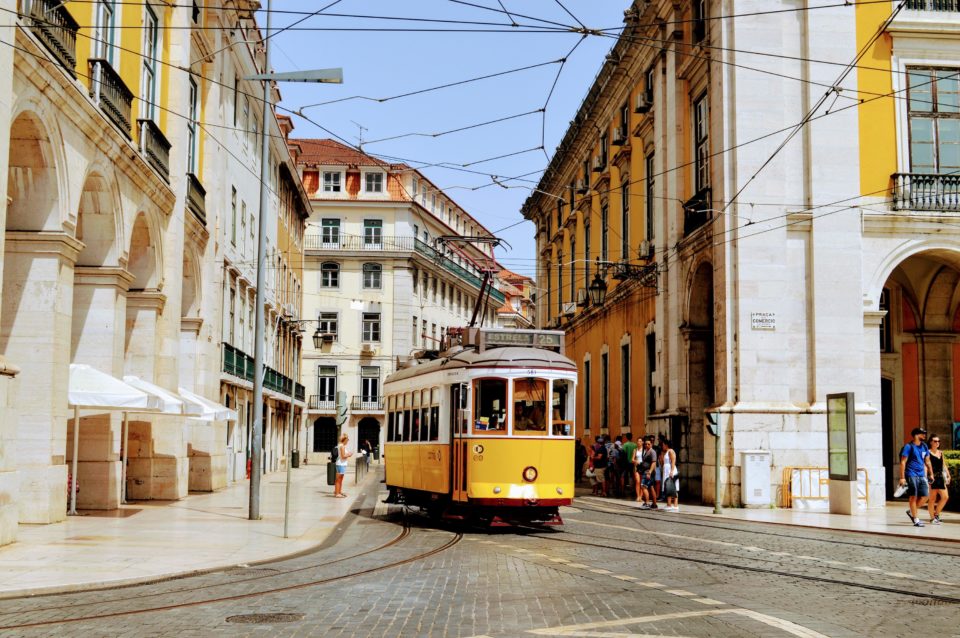City break (noun): a short holiday spent in a city, such as when on business travel.
Before there was bleisure travel, there was the city break—the short space of leisure time that grants you access to the cultural and culinary amenities that big cities offer. In this series from TripIt, we explore some of the world’s best cities for planning a quick getaway or extending a work trip.
Here are our tips for making the most of your city break in Lisbon.
Where to fly in
Lisbon is served by Humberto Delgado Airport (LIS), located seven kilometers (less than four and a half miles) from the city center.
Once on the ground, travelers have myriad public transit options for continuing on to their final destination, including the Metro, bus, rail, and shuttle. For example, if your hotel or vacation rental is located in the city center, you can take the ‘Aeroporto – Saldanha’ line (aka, the Red line) to get from the airport to downtown Lisbon in about 20 minutes.
Alternatively, cabs and ride shares are also available from LIS.
Where to stay during your city break
Speaking of hotels in downtown Lisbon, Brown’s Central Hotel is true to its name—centrally located with easy access to city attractions (it’s just a two-minute walk to the Santa Justa Lift), the Metro, as well as shops, restaurants, and cafes.
The Ivens, a nod to Portuguese explorers Roberto Ivens and Hermenegildo Capelo, features 87 rooms, several restaurants, and a jazz club. The rooms themselves have been mindfully designed to offer “a place where an explorer can rest.”
Looking for an oasis away from the city’s hustle and bustle? Memmo Alfama, nestled in Lisbon’s oldest neighborhood, has great views from its rooftop terrace—not to mention its pool is perfect for cooling off after a day out exploring.
After more budget-friendly digs? The Independente—part hotel, part hostel—offers a relaxed, yet trendy vibe. Perfect for solo travelers, budget travelers, or those just looking for a unique stay.
Vacation rentals, like those booked through Airbnb, are also available in Lisbon.
How to get around
Part of Lisbon’s charm is its easy walkability. Plan accordingly by packing comfortable shoes for walking from place to place.
When walking isn’t feasible or desirable, Lisbon offers myriad public transit options, including four Metro lines, a bus system, and, of course, its iconic trams.
Lisbon has two types of trams: the traditional (and more tourist-oriented) trams that traverse the streets of the city center. There are also the modern trams that are purely transit-oriented, i.e., designed to get you from A to B, and operate both in and outside the city center.
Alas, we can’t forget about the funiculars—Lisbon’s hill-climbing trams—Ascensor da Bica, Ascensor da Glória, and Ascensor do Lavra.
At the time of publication, a single tram ticket costs €3. On the traditional trams, you can buy a ticket from the driver; the modern trams have a ticket machine on board. There is also a 24-hour Viva Viagem transit pass, at a cost of €6.40, that allows you to ride any tram, bus, and the Metro. You can purchase this pass at a Metro, ferry, or local train station.
Thinking about exploring Lisbon on two wheels? You have several micromobility options for getting around, including bike- and scooter-sharing programs provided by Lime, Bird, Gira, and Hive (via the FREE NOW app).
Uber is also available in Lisbon.
Pro tip: Use TripIt’s Navigator feature to search transportation options available to you. It will show you the estimated costs and travel times for each option, so you can decide which works best. For example, if you add a restaurant reservation to your itinerary (more on where to eat, below), Navigator also helps you find the best transportation options for getting to your table. You can find Navigator within your plan details screens.
If you plan to travel outside Lisbon to other cities in Portugal (e.g., Porto), you have several options to do so, but perhaps the most cost-effective and eco-friendly option is via Comboios de Portugal train. If you choose to do this, I would definitely recommend booking in advance, and taking the Alfa Pendular (versus the Intercidades) as it’s a high-speed train (i.e., fewer stops) and offers a more comfortable, modern cabin.
Where to eat
Breakfast on the brain? For a caffeine fix and tasty pastry, pop into Copenhagen Coffee Lab. The organic coffee shop has several locations in Lisbon, including one walking distance from Brown’s Central Hotel.
Markets more your scene? Time Out Market Lisbon is your one-stop shop for light bites, traditional dishes, drinks, desserts, and more. You can also take a cooking class, and learn how to make (among other things) the classic Portuguese pastry, Pastel de Nata (pictured above).
A former fabric factory, LxFactory is now home to more than 50 restaurants, bars, and cafes, as well as shops (more on what to do in Lisbon, below), and is well worth a visit for its dining options.
Looking for an overview of Portugal’s wine regions? Book a tasting at From the Vine, Portugal’s first wine-tasting bar. Learn about the country’s wine-producing regions while you sip said wines and sample local cheeses and accoutrements.
Finally, let’s talk dinner plans. For traditional Portuguese dishes, choose from the delectable dishes at Taberna da Rua das Flores, Belcanto, Boi-Cavalo, or (my personal favorite) the charming Alfama Cellar.
Craving Asian cuisine? Consider Yakuza for a fusion of flavors from the East and West; Boa Bao for its flair for adventurous dishes; or Bonsai, Portugal’s first-ever Japanese restaurant.
Looking for vegan or vegetarian options? Check out The Food Temple, Os Tibetanos, or Arkhe—with the latter, budget accordingly.
More of a meat eater? Lisbon is also home to many steakhouses, including Taberna do Lopes First Floor, BYF Steakhouse, and Sala de Corte.
Tip: When possible, book restaurant reservations in advance. Download an app like The Fork to make booking (and searching for) reservations easy. Then, forward your reservation confirmation(s) to TripIt to keep all your bookings in one place.
What to do on your city break
If you hadn’t heard of Fado before your trip to Lisbon, that will soon change. Fado—the music genre that traces its roots to Lisbon circa the 1820s—is often melancholic, sometimes mournful, and entirely unique to the region. Of course, the best way to understand Fado is to experience it for yourself—and one place to do it is at A Baiuca. Can’t make it to a show, or want to immerse yourself even further? You can pay a visit to the Museu do Fado (Fado Museum)—located in Alfama—“to see, hear, and feel Fado.”
As I mentioned above, be sure to spend some time at LxFactory—especially if your trip falls on a Sunday, when even more local vendors and artisans will be present.
Love supporting independent bookstores on your travels? Same. Check out Ler Devagar, located at LxFactory. (Hint: You’ll want to snap some photos for Insta while you’re browsing!) Near the Chiado neighborhood? Head to Livraria Betrand—the oldest operating bookstore in the world. The English-language display is modest, but worth a browse nonetheless.
Less interested in shopping, and more into street art? Lisbon is a mural hunter’s dream! Explore the street art scene on your own, or book a walking tour with Street Buddha Tours for a guided experience from a local street artist.
As Lisbon is located on the Tagus River, you’ll have plenty of options for enjoying a day on the water, including booking a scenic sailboat ride and/or learning to surf (at nearby beaches). Even just taking a stroll along the riverfront provides you with lots of opportunities for seeing some of Lisbon’s most iconic sights, including the Belém Tower, the 25 de Abril Bridge, and the Cristo Rei statue—the latter located across the river, but easily spotted from the Lisbon end of things.
Want to get out of the city for the day? There are loads of nearby excursions worth your time, including a day trip with Keep It Local Tours to the magical town of Sintra, and/or catching the train to seaside Cascais.
Note: As destinations reopen around the world, be sure to consult and adhere to all local guidelines and travel restrictions, as they vary widely and will continue to change. One way to stay on top of changing guidelines is to consult the COVID-19 travel guidance feature in the TripIt app for destination-specific information, including testing and vaccination requirements, current infection rates, quarantine rules upon arrival, and other information you need to know before visiting the area.
There has never been a better time to plan your next trip and make your Dream vacation a reality . Whether you've been dreaming of relaxing on a sun-kissed beach, exploring ancient cities, or embarking on an epic adventure, now is the perfect moment to make it happen.













